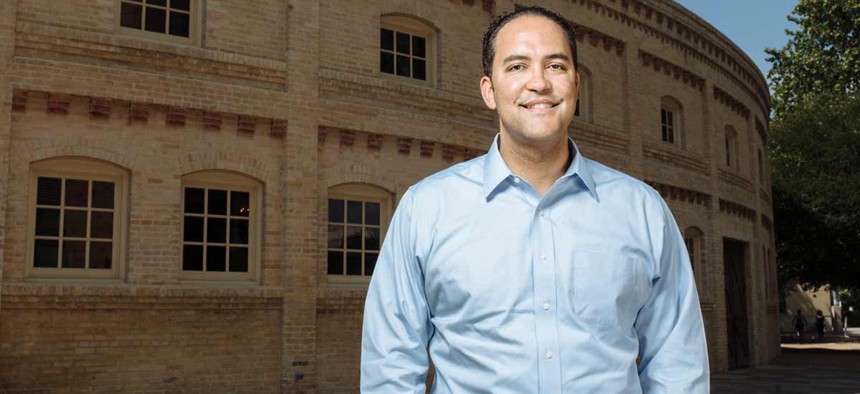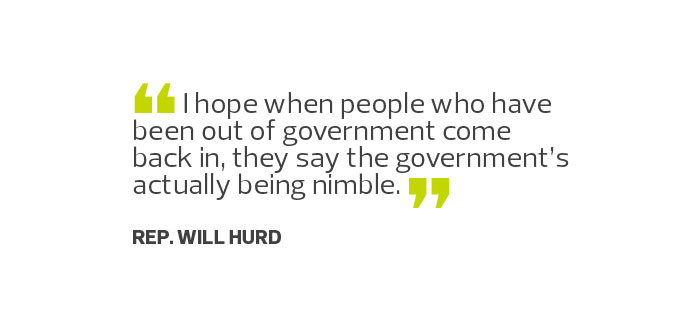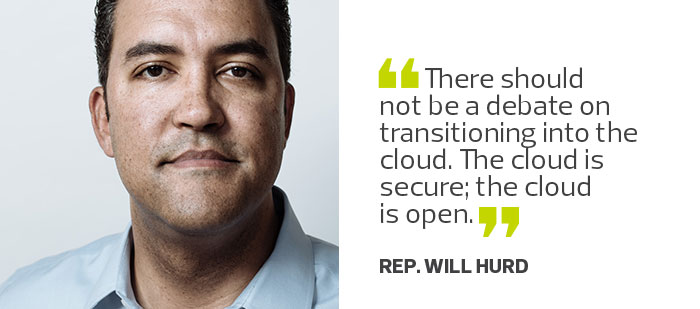sponsor content What's this?
The Congressman at the Forefront of Federal IT Modernization

Presented by
FedTech

Rep. Will Hurd says the debate about using the cloud is over and further modernization should begin.
When Rep. Will Hurd, R-Texas, livestreamed much of a 1,600-mile drive from Texas to the Capitol with a colleague, the escapade attracted national attention for the tech-savvy congressman.
But Hurd is no stranger to technology or thinking hard about IT. He’s the chairman of the House Oversight and Reform subcommittee on IT and one of the rare members of Congress with a background in cybersecurity.
FedTech Managing Editor Mike Gruss spoke with Hurd about how the government finds the cyberworkers it needs, proof that a digital transformation is under way, and why agencies should get out of the data center game.
FEDTECH: Where would you like CIOs to show improvement?
HURD: There is not an agreed-upon set of job descriptions across the federal government when it comes to IT. If we have a 10,000-person gap — which is what the GAO [Government Accountability Office] thinks we have — and we don’t know how to fill it, we are not going to get the right people with the right skill sets. When I look at the problems across government, it’s not necessarily technology, it’s leadership. The technology is there to solve these problems.
FEDTECH: What’s the best way to close that gap?
HURD: Let’s say I need 1,438 network administrators with these skill sets. We should provide scholarships to kids who graduate high school and want to go into cybersecurity. If you get money for school, you serve the federal government. Then, after you finish that time, you go work in the private sector. The private sector is going to loan you back for the proverbial weekend or 10-day report. The loan is not going to solve the gap, but if you work in the government, you are going to get exposure to large networks.
FEDTECH: The back-and-forth appeals to some agencies because employees see how the other side is running their shop.
HURD: It would allow people who have the exposure to the latest technologies back into the federal system. But there is a macro issue here. We need to make sure more kids are getting exposed to coding. It is a problem that affects every industry.
FEDTECH: Why should agency CIOs be excited about the IT reform bill you wrote, which has passed the House?
HURD: The concept of “use it or lose it” will be dead when it comes to IT. You will have motivations to save money because if you save money, you will have access to it for three years for other modernizations. Not every CIO is going to be able to take advantage of this, but those who have been focusing on modernization are going to have another tool. This is important, not only to introduce new technology, but also to help make your operation more efficient.

FEDTECH: Ideally, moving to the cloud leads to smaller data centers, which leads to more money for cybersecurity?
HURD: That’s the best case. The GAO identified two agencies whose transition to the cloud took $2 million. How was that money being used? We’re already spending a lot of money — close to $19 billion a year on IT goods and services — and we need the CIOs to spend that money more effectively. You can’t hold the CIOs accountable if they don’t have responsibility for what goes on their network.
FEDTECH: Is it working? Are agencies becoming more efficient and effective?
HURD: It’s working, and the proof is that there’s friction among the CIOs, CFOs and agency heads. You are seeing CIOs try to take the authority they’ve been given by Congress.
FEDTECH: Should agencies be in the data center business, or could it be almost completely outsourced?
HURD: There should not be a debate on transitioning into the cloud. The cloud is secure; the cloud is open. It’s hard to make broad generalizations across the entire federal government. But why are agencies using their time and energy managing their own data center when that can be automated?
FEDTECH: Should federal buildings have Wi-Fi?
HURD: I think it should be explored. It’s hard for me to advocate for a particular tool. We should be thinking about the whole scope and what we can introduce into our network in a secure way to make us more efficient.

FEDTECH: Does your cybersecurity background influence your committee work?
HURD: I try to talk with our folks in the industry who are on the cutting edge of technology, but I’m not really an expert. I’m trying to make sure that we remove any barriers that our CIOs have to introducing new technology to our network. Cybersecurity right now really means information sharing, privacy, emerging technology and IT procurement.
FEDTECH: What makes you think agencies are doing cybersecurity right?
HURD: There are some great people across the government working hard every single day to protect our information. The fact that WannaCry did not have a bigger impact in the U.S. is one sign. People are learning from other folks’ mistakes.
FEDTECH: How do you expect federal IT to change in the next year?
HURD: One is quantum computing and what impact that’s going to have on us. We’re also looking at advances in artificial intelligence and machine learning and how that is going to impact our ability to process data. The steps we’ve taken to get data standards in government are coming to fruition. We’re going to mine that data to answer some really interesting questions. The Office of American Innovation is focused on changing how the government operates. That could help with inertia.
FEDTECH: How will the new executive order on cybersecurity change what we see day to day in agencies?
HURD: I hope when people who have been out of government come back in, they say the government’s actually being nimble. The government can be more audacious in setting goals. The cybersecurity order is trying to lay out some direction.
This content is made possible by FedTech. The editorial staff of Nextgov was not involved in its preparation.





